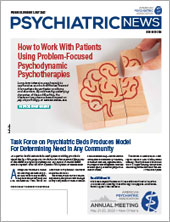In an amicus brief, APA and dozens of other medical organizations told an Alabama court that effective treatment of gender dysphoria saves lives and banning the availability of gender-affirming care will irreparably harm youth. The brief was filed in a lawsuit challenging Alabama’s recently passed law, known as the Vulnerable Child Compassion and Protection Act (SB 184). The law makes gender-affirming care for children and adolescents, such as puberty blockers or hormone therapy, a felony, punishable by up to 10 years in prison and a fine of up to $15,000.
The law claims that “[t]he sex of a person is the biological state of being female or male, based on sex organs, chromosomes, and endogenous hormone profiles, and is genetically encoded into a person at the moment of conception, and it cannot be changed.”
In response, four Alabama families, a pastor, a pediatrician, and a clinical psychologist filed a lawsuit challenging the law. The U.S. Department of Justice joined the suit, alleging that the law violates the 14th Amendment’s Equal Protection Clause by discriminating against patients on the basis of sex and transgender status.
APA filed its amicus brief along with more than 20 other professional organizations, including the AMA and the American Academy of Pediatrics.
In the brief, the medical associations detail the well-accepted medical guidelines for treating gender dysphoria in adolescents and outline the damage denying such care to youth who need it would cause. “The results of multiple studies indicate that adolescents suffering from gender dysphoria who receive medical interventions as part of their gender-affirming care experience improvements in their overall well-being,” the brief states. It notes one study’s finding that “approximately nine in ten transgender adults who wanted puberty blocking treatment but did not receive it reported lifetime suicidal ideation.”
The brief notes that the text of the Alabama law includes a host of incorrect medical information, claiming that “a substantial majority of children who experience discordance between their sex and identity will outgrow the discordance once they go through puberty and will eventually have an identity that aligns with their sex.” The law endorses a “wait-and-see” approach, suggesting that “a large majority” of youth with gender dysphoria will adopt an “identity congruent with their sex by late adolescence.”
“This assertion lacks scientific support,” the medical organizations state in the brief. “Using ‘watchful waiting’ with gender-dysphoric adolescents can cause immense harm by denying them treatment that could alleviate their distress and forcing them to experience full endogenous puberty, resulting in physical changes that may be reversed—if at all—only through surgery.
“[R]esearch shows that adolescents with gender dysphoria who receive puberty blockers and/or hormone therapy experience less depression, anxiety, and suicidal ideation,” the brief continues. “Several studies have found that hormone therapy is associated with reductions in the rate of suicide attempts and significant improvement in quality of life.”
Shortly after the law went into effect on May 8, a federal judge issued a partial injunction, blocking the part of the law that makes prescribing hormones or puberty-blocking drugs a felony. Other aspects of the law remain in place, including the requirement that school personnel are not allowed to withhold from parents their child’s gender identity, as well as the ban on gender-affirming surgeries for youth. In response to the injunction, Republican Gov. Kay Ivey called the ruling a temporary roadblock, and the state’s Attorney General Steve Marshall indicated his intent to appeal.
In a statement, Clinton Martin, M.D., president of the Alabama Psychiatric Physicians Association (APPA) said that APPA “strongly disagrees with any legislative efforts to undermine the patient-doctor relationship. This is a sacred bond and should be free from political or religious biases.”
The Alabama law is part of a push across the country to restrict access to gender-affirming care for transgender youth. Earlier this year, APA joined another amicus brief in support of a lawsuit challenging a nonbinding directive issued by the Texas governor, which claims that gender-affirming care constitutes child abuse (See
Psychiatric News). A Texas court had blocked the directive and stopped the state from investigating families of transgender youth, but in May the Texas Supreme Court ruled that those investigations could continue.
Researchers from Yale University and the University of Texas Southwestern Medical Center issued a report stating that the medical claims included in the Alabama law and in the Texas directive “are not grounded in reputable science and are full of errors of omission and inclusion.” It goes on to say that “[b]y omitting the evidence demonstrating the substantial benefits of treatment for gender dysphoria, and by focusing on invented and exaggerated harms,” the Alabama law and the Texas directive “portray a warped picture of the scientific evidence.”
The researchers, including three physicians, point out in their executive summary that “a solid body of reputable evidence” shows that gender-affirming care is lifesaving. “[I]t would be considered unethical to withhold medical care from patients with gender dysphoria, just as it would be unethical to withhold potentially lifesaving care for patients with any other serious medical condition.” ■

